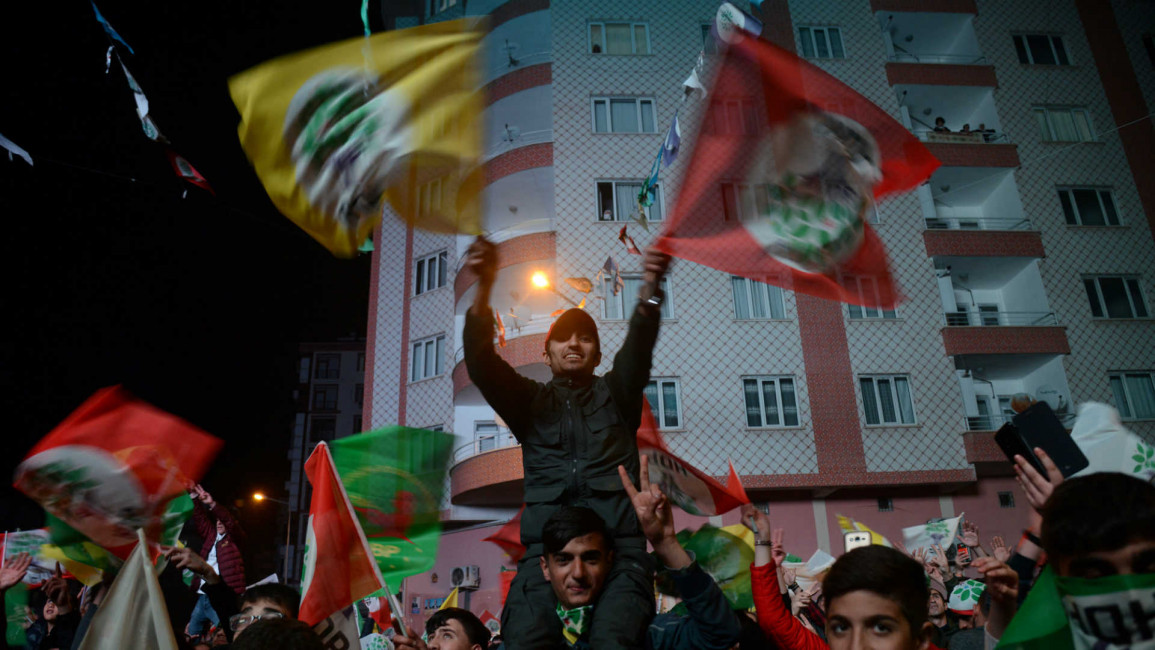Kurdish-majority provinces split in Turkey's tightly fought local elections
Turkey's majority Kurdish southeast delivered mixed results for the pro-Kurdish People's Democratic Party (HDP) in Sunday's local elections, with a return to power in several provinces. But it was also marked by a shocking win for the ruling Justice and Development Party (AKP) in Sirnak.
The nationwide municipal elections saw the AKP lose the capital Ankara to the opposition Republican People's Party (CHP), as well as a hotly contested result in the country's largest city Istanbul.
Although the AKP claimed a victory in Istanbul on Sunday, the country's state news agency Anadolu now places CHP candidate Ekrem Imamoglu in the lead with almost all of the ballots counted.
The ruling AKP won around 44.3 percent of the vote nationwide, but claims a majority under an electoral alliance with the Nationalist Movement Party (MHP).
Official results are yet to be confirmed.
Sunday's local elections have been seen not only as a key nationwide test of support for Erdogan's executive presidency, but also a local test of strength for the HDP.
While the party secured resounding victories in both the 2014 local elections and the June 2015 national elections, the southeast has since faced extreme hardship under a government campaign to eradicate the Kurdistan Workers' Party (PKK), a separatist militia which has been engaged in an on-off civil war with the Turkish state for more than 30 years.
Kurdish-majority cities across the southeast faced weeks-long curfews and military offensives which birthed landscapes which appeared not dissimilar from those in neighbouring Syria and Iraq.
The Turkish government then seized over 100 municipalities which the HDP had won in 2014, and jailed 60 mayors, during a crackdown on the party that began in 2016. The governance of those municipalities was passed into the hands of government-appointed trustees.
The co-leaders of the party, as well as multiple MPs, have also been arrested and accused of links to the PKK, which Turkey considers a terrorist organisation.
The HDP on Sunday delivered a resounding victory in the province of Diyarbakir, known as the cultural and unofficial political capital of Turkey's Kurdish population.
|
|
The party's co-mayor candidates Selcuk Mizrakli and Hulya Alokmen Uyanik won 63 percent of the vote, beating AKP candidate and previous government trustee Cumali Atilla, who earned 30 percent of the vote, according to unofficial results.
"They robbed us of our will and we overturned this," Diyarbakir resident Abdullah Elmas told Reuters.
Mizrakli said the party's victory in the province was dedicated to fellow politicians Leyla Guven and Gultan Kisanak on hunger strike in prison.
Gultan Kisanak and Firat Anli were elected co-mayors of the Diyarbakir Metropolitan Municipality in 2014 but replaced by a state-appointed trustee in 2016. The HDP runs dual candidates, one female and one male, for roles such as mayor, and aims to have equal representation for men and women.
"The Kurdish people have clearly stated their will, determination and belief. They have expressed their desire for peace and coexistence of peoples," Mizrakli told the Mesopotamian Agency.
The party retained the provinces of Siirt, Hakkari, Mardin and Van, which it had won in the 2014 local elections.
The HDP won a little over 50 percent of the vote in Igdir province, where the AKP-MHP alliance joined with the nationalist Good Party (IYI) in an attempt to prevent the HDP from reclaiming the seat.
The province is considered strategic for those parties due to its population of ethnic Azeris, who live among a large population of Kurds and tend to support right-wing, nationalist parties.
The AKP has said it will contest the result in Igdir due to "voting irregularities", as well as in Ankara and Istanbul, according to pro-government Daily Sabah.
|
|
The party lost several of the provinces it previously held to the AKP, including Bitlis, Mus and Agri.
In its most severe loss, the HDP share of the vote dropped by 20 percent in Sirnak, a province bordering Iraq, delivering a more than 60 percent majority to the AKP.
The victory by the ruling party came as a shock to opposition voices and Turkey analysts. Some blamed the stunning loss on the large presence of soldiers from elsewhere in the country voting in the province.
In Dersim, otherwise known as Tunceli by the Turkish government, the Communist Party (TKP) was awarded its first ever mayor, Fatih Mehmet Macoglu. The majority Kurdish Alevi province was previously controlled by the HDP but has a strong leftist tradition.
The HDP also won out in the northeastern province of Kars, which borders Armenia. Ayhan Bilgen delivered a historic win for the party, wrestling the multicultural province out of the hands of the ultranationalist MHP.
The party earlier made the decision not to field candidates in the west of Turkey, instead asking its supporters to vote for the CHP as part of an informal alliance which has seen CHP supports deliver protest votes for the HDP in previous elections to help the embattled party pass the 10 percent electoral threshold, the world's highest.
The informal alliance allowed the CHP to claim municipalities such as Esenyurt, an Istanbul district with a large Kurdish population in which a split opposition vote in 2014 allowed for an AKP victory. The CHP on Sunday won the district with 51 percent of the vote.
Analysts also credited the CHP's Ankara, Adana, Mersin and Hatay victories to usual HDP voters.



